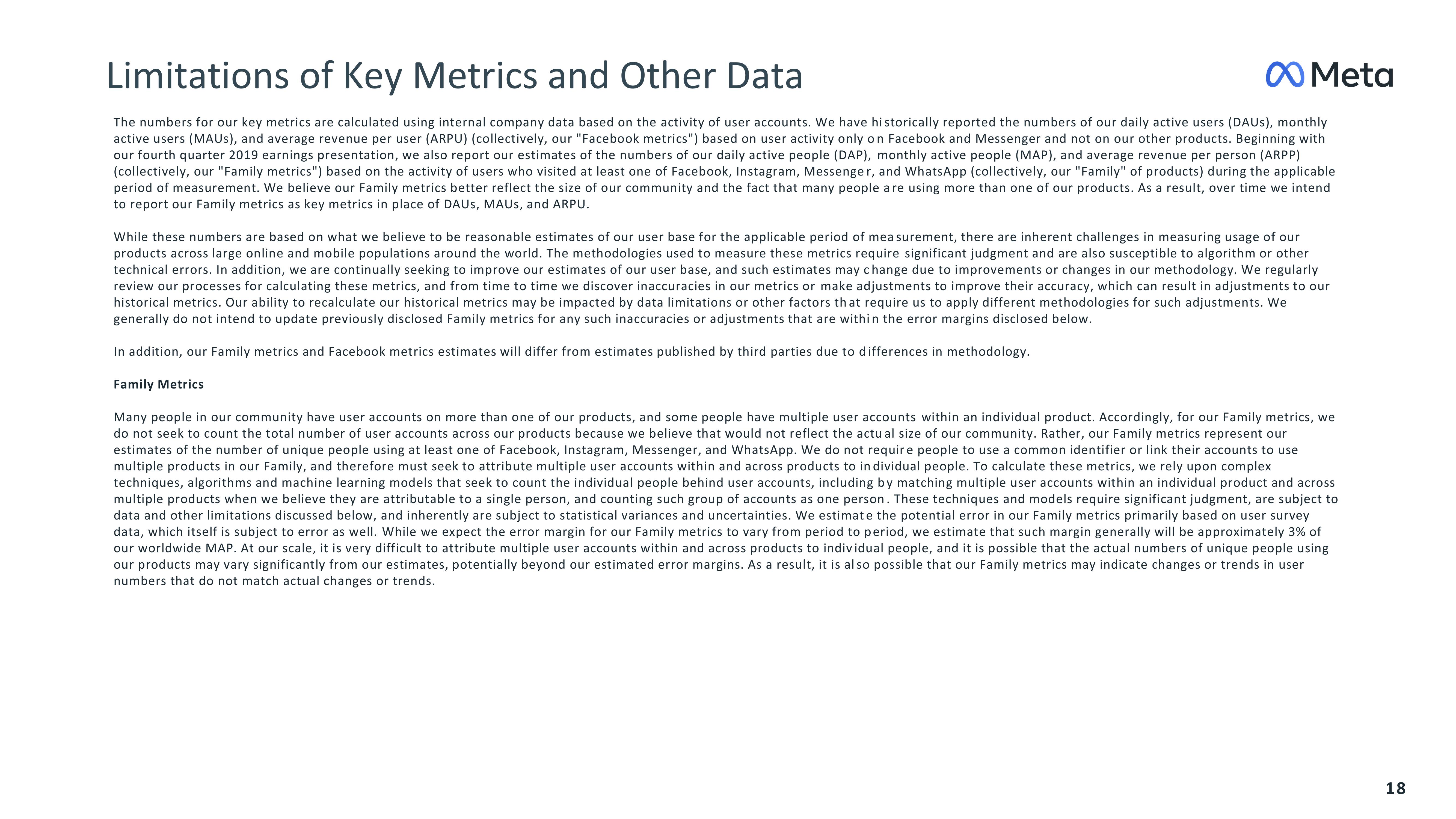Meta Results Presentation Deck
Limitations of Key Metrics and Other Data
∞ Meta
The numbers for our key metrics are calculated using internal company data based on the activity of user accounts. We have historically reported the numbers of our daily active users (DAUS), monthly
active users (MAUS), and average revenue per user (ARPU) (collectively, our "Facebook metrics") based on user activity only on Facebook and Messenger and not on our other products. Beginning with
our fourth quarter 2019 earnings presentation, we also report our estimates of the numbers of our daily active people (DAP), monthly active people (MAP), and average revenue per person (ARPP)
(collectively, our "Family metrics") based on the activity of users who visited at least one of Facebook, Instagram, Messenger, and WhatsApp (collectively, our "Family" of products) during the applicable
period of measurement. We believe our Family metrics better reflect the size of our community and the fact that many people are using more than one of our products. As a result, over time we intend
to report our Family metrics as key metrics in place of DAUS, MAUS, and ARPU.
While these numbers are based on what we believe to be reasonable estimates of our user base for the applicable period of measurement, there are inherent challenges in measuring usage of our
products across large online and mobile populations around the world. The methodologies used to measure these metrics require significant judgment and are also susceptible to algorithm or other
technical errors. In addition, we are continually seeking to improve our estimates of our user base, and such estimates may change due to improvements or changes in our methodology. We regularly
review our processes for calculating these metrics, and from time to time we discover inaccuracies in our metrics or make adjustments to improve their accuracy, which can result in adjustments to our
historical metrics. Our ability to recalculate our historical metrics may be impacted by data limitations or other factors that require us to apply different methodologies for such adjustments. We
generally do not intend to update previously disclosed Family metrics for any such inaccuracies or adjustments that are within the error margins disclosed below.
In addition, our Family metrics and Facebook metrics estimates will differ from estimates published by third parties due to differences
methodology.
Family Metrics
Many people in our community have user accounts on more than one of our products, and some people have multiple user accounts within an individual product. Accordingly, for our Family metrics, we
do not seek to count the total number of user accounts across our products because we believe that would not reflect the actual size of our community. Rather, our Family metrics represent our
estimates of the number of unique people using at least one of Facebook, Instagram, Messenger, and WhatsApp. We do not require people to use a common identifier or link their accounts to use
multiple products in our Family, and therefore must seek to attribute multiple user accounts within and across products to individual people. To calculate these metrics, we rely upon complex
techniques, algorithms and machine learning models that seek to count the individual people behind user accounts, including by matching multiple user accounts within an individual product and across
multiple products when we believe they are attributable to a single person, and counting such group of accounts as one person. These techniques and models require significant judgment, are subject to
data and other limitations discussed below, and inherently are subject to statistical variances and uncertainties. We estimate the potential error in our Family metrics primarily based on user survey
data, which itself is subject to error as well. While we expect the error margin for our Family metrics to vary from period to period, we estimate that such margin generally will be approximately 3% of
our worldwide MAP. At our scale, it is very difficult to attribute multiple user accounts within and across products to individual people, and it is possible that the actual numbers of unique people using
our products may vary significantly from our estimates, potentially beyond our estimated error margins. As a result, it is also possible that our Family metrics may indicate changes or trends in user
numbers that do not match actual changes or trends.
18View entire presentation